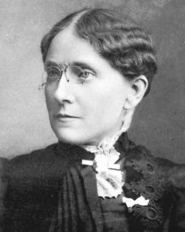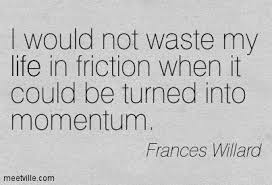He has told you, O man, what is good; and what does the Lord require of you but to do justice, to love, kindness, and to walk humbly with your God? (Micah 6:8).
“…to stand by the great cause of poor, oppressed humanity. …This has been my ‘call’ from the beginning, by  nature and by nurture; let me be true to its inspiring and cheery mandate even ‘unto this last.’” (From France Willard’s autobiography, “Glimpses of Fifty Years”, p. 694.)
nature and by nurture; let me be true to its inspiring and cheery mandate even ‘unto this last.’” (From France Willard’s autobiography, “Glimpses of Fifty Years”, p. 694.)
“’Except the Lord build the city, they labor in vain that build,’ and she has always sought to commit her work and her ways to the keeping of the Divine Master in a simple child-like faith that He would lead her in the way she should go and would make all her paths straight before her” (“Introduction, pg. ix”)
Though her name has been forgotten today Frances Willard was the most famous woman in America, and was even well-known in Europe, during the late 19th century. Frances Willard died in New York in 1898, and her body was transported by rail to Chicago, pausing for services along the way like a presidential funeral train. In Chicago, 30,000 persons filed by her casket in one day. Ruth Bordin wrote, “The nation mourned her with a grief, admiration, and respect it would have bestowed on a great national hero or martyred president. No woman before or since was so clearly on the day of her death this country’s most honored woman.” Flags flew at half-mast in New York, Chicago, and Washington, D. C.
I recommend two books on the life of this fascinating woman:
1. Anna Gordon’s The Beautiful Life of Frances E. Willard. I am privileged to have an original 1898 Memorial edition (Women’s Temperance Publishing Association, Chicago, IL, 1898). There are still original books available as well as reprints in online bookstores.
- Frances Willard’s autobiography, Glimpses of Fifty Years: The Autobiography of an American Woman. Again, there are beautiful reprints available.
In a previous post, January 23, 2013, I listed the many accomplishments of Frances Willard including her temperance work, her aid to poor and destitute women, her aid to the refugees from the Armenian Christians who were being persecuted in Turkey, and the advances she made in education. In her day women struggled to get into college; women today can be grateful for equal opportunities in education thanks to women like Frances Willard.
In this post I would like to present just a sampling of the wisdom of this great woman.
To be busy doing something that is worthy to be done is the happiest thing in all this world for girl or boy, for old or young. (pg. 70)
Frances’s learned a valuable lesion from her blind friend. This young girl maintained a cheerful attitude because … “happiness is from within; that the real light shines in the heart, not in the eyes, and that everybody who will be glad may be” (pg. 91).
On Christian fellowship – I honestly believe that I regard all the churches, the branches rather of the one Church, with feelings of equal kindness and fellowship. … The churches are all fighting nobly and zealously to make the world better and happier. Oh, I earnestly pray that as I grow older, the kindly, all-loving, catholic spirit may more deeply ground itself in my heart! (Pg. 127)
 And – How much of life’s present friction will be avoided when the average mind discovers that the central aim of any life is best conserved by choosing for one’s motto “In non-essentials, liberty”! (Pg. 201)
And – How much of life’s present friction will be avoided when the average mind discovers that the central aim of any life is best conserved by choosing for one’s motto “In non-essentials, liberty”! (Pg. 201)
On perseverance – But I have come to believe that it is well for us, well for our characters, those beautiful fabrics we are weaving every day, to do those things that do not make us happy, but only make us strong. (Pg. 147)
As a young woman, Frances sought for satisfaction in life. She believed that the answer is in Christ. Christ has in His nature the elements that will make all this true when we behold Him face to face. We do not know that we are seeking here when we strive so hard and fret so much. … we shall erelong awake to life and be restless and hungry and thirsty no more! (Pg. 184)
It broke Frances’s heart to leave behind her girls at Evanston College where she had labored for years, giving the best of her life. She was forced out by the new president who refused to examine his lax rules for the students as she advised. She could no longer stay there in good conscience lying to the parents that their daughters were not at risk spiritually. Though she was more “in the right” and agonized over the decision to leave her young women behind she received peace when she rested in God. She heard His voice saying, good to forgive, best to forget. (Pg. 239)
In the turning point in her life, when Frances stepped away from a secure job for an unknown future she turned to her Bible for comfort. This verse gave her assurance, Trust in the Lord, and do good; so shalt thou dwell in the land, and verily thou shalt be fed. (Psalm 37:3) (Pg. 337)
More on forgiveness: Frances met Pandita Ramabai. (See my posts on this amazing woman from India, Dec. 22, 2011 and Sept. 6, 2012). Frances was very impressed with the gentleness of Ramabai. This seems to be her motto. “Has any wronged thee: Be bravely avenged; slight it, and the work’s begun; forgive it, and ‘tis finished.” (Pg. 558)
In her religious journey Frances sought to lead others to Christ. In her day Unitarianism was on the rise. She struggled with the idea of a Trinity as many do, but finally she decided to adjust myself to the idea of “Three in one” and “One in three.” … I translate the concept of God into the nomenclature and personality of the New Testament. What Paul says of Christ, is what I say; the love John felt, it is my dearest with to cherish. (Pg. 624)
On Companionship – “Tell me with whom thou goest and I’ll tell thee what thou doest.” No precept was ever more frequently repeated and enforced by my parents than this. (Pg. 637)
On knowing ourselves – I wonder if we really know ourselves in respect of discount as well as we do in respect of advantage? It seems equally important that we should, else our undertakings will be out of all proportion to our powers, and failure a foregone conclusion. I have always believed that in a nobler state of society we should help each other by frank and kindly criticism, couple with equally frank praise, and have held, in the face of steady contradiction from my friends, that Christian people ought thus to help each other here and now. (Pg. 646)
Finally, I cannot help but include this piece of “prophecy”. Frances lamented the fact that the newly invented “phonograph” would ruin the beauty and intimacy of good conversation.
To my thought, conversation is the filling and soul of social life, the culmination of the spirit’s possible power, the giving of a life-time in an hour, though its form and method certainly have changed in this electric age when the phonograph has come into being. I half suspect that there will be a strike in the physical manufactory one of these day; the muscles of the face will refuse to do their duty, the tongue will make believe paralytic, and the lips will join the rebellion. (Pg. 686)
Frances said this before radio or television or computers or I-phones or texting or tweeting!! How far we have traveled! Do today’s teens even know how to have a conversation that is more than 10 seconds long?
I pray that at the end of my life I will enjoy the old hymn so much loved by Frances Willard and be able to sing its words truly:
May the Lord He will be glad of me,
May the Lord He will be glad of me,
May the Lord He will be glad of me,
In the heaven He’ll rejoice

